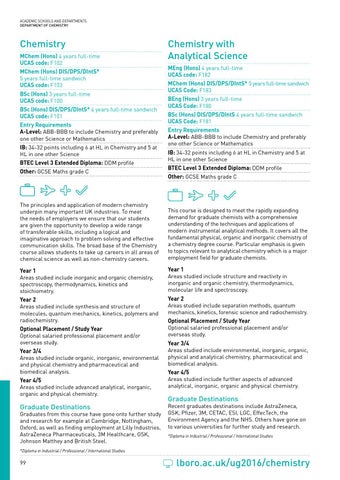ACADEMIC SCHOOLS AND DEPARTMENTS DEPARTMENT OF CHEMISTRY
Chemistry MChem (Hons) 4 years full-time UCAS code: F102 MChem (Hons) DIS/DPS/DIntS* 5 years full-time sandwich UCAS code: F103 BSc (Hons) 3 years full-time UCAS code: F100 BSc (Hons) DIS/DPS/DIntS* 4 years full-time sandwich UCAS code: F101 Entry Requirements A-Level: ABB-BBB to include Chemistry and preferably one other Science or Mathematics IB: 34-32 points including 6 at HL in Chemistry and 5 at HL in one other Science BTEC Level 3 Extended Diploma: DDM profile Other: GCSE Maths grade C
Chemistry with Analytical Science MEng (Hons) 4 years full-time UCAS code: F182 MChem (Hons) DIS/DPS/DIntS* 5 years full-time sandwich UCAS Code: F183 BEng (Hons) 3 years full-time UCAS Code: F180 BSc (Hons) DIS/DPS/DIntS 4 years full-time sandwich UCAS Code: F181 Entry Requirements A-Level: ABB-BBB to include Chemistry and preferably one other Science or Mathematics IB: 34-32 points including 6 at HL in Chemistry and 5 at HL in one other Science BTEC Level 3 Extended Diploma: DDM profile Other: GCSE Maths grade C
The principles and application of modern chemistry underpin many important UK industries. To meet the needs of employers we ensure that our students are given the opportunity to develop a wide range of transferable skills, including a logical and imaginative approach to problem solving and effective communication skills. The broad base of the Chemistry course allows students to take up careers in all areas of chemical science as well as non-chemistry careers.
This course is designed to meet the rapidly expanding demand for graduate chemists with a comprehensive understanding of the techniques and applications of modern instrumental analytical methods. It covers all the fundamental physical, organic and inorganic chemistry of a chemistry degree course. Particular emphasis is given to topics relevant to analytical chemistry which is a major employment field for graduate chemists.
Year 1 Areas studied include inorganic and organic chemistry, spectroscopy, thermodynamics, kinetics and stoichiometry.
Year 1 Areas studied include structure and reactivity in inorganic and organic chemistry, thermodynamics, molecular life and spectroscopy.
Year 2 Areas studied include synthesis and structure of molecules, quantum mechanics, kinetics, polymers and radiochemistry.
Year 2 Areas studied include separation methods, quantum mechanics, kinetics, forensic science and radiochemistry.
Optional Placement / Study Year Optional salaried professional placement and/or overseas study. Year 3/4 Areas studied include organic, inorganic, environmental and physical chemistry and pharmaceutical and biomedical analysis. Year 4/5 Areas studied include advanced analytical, inorganic, organic and physical chemistry.
Graduate Destinations
Graduates from this course have gone onto further study and research for example at Cambridge, Nottingham, Oxford, as well as finding employment at Lilly Industries, AstraZeneca Pharmaceuticals, 3M Healthcare, GSK, Johnson Matthey and British Steel.
Optional Placement / Study Year Optional salaried professional placement and/or overseas study. Year 3/4 Areas studied include environmental, inorganic, organic, physical and analytical chemistry, pharmaceutical and biomedical analysis. Year 4/5 Areas studied include further aspects of advanced analytical, inorganic, organic and physical chemistry.
Graduate Destinations
Recent graduates destinations include AstraZeneca, GSK, Pfizer, 3M, CETAC, ESI, LGC, EffecTech, the Environment Agency and the NHS. Others have gone on to various universities for further study and research. *Diploma in Industrial / Professional / International Studies
*Diploma in Industrial / Professional / International Studies
99
lboro.ac.uk/ug2016/chemistry
